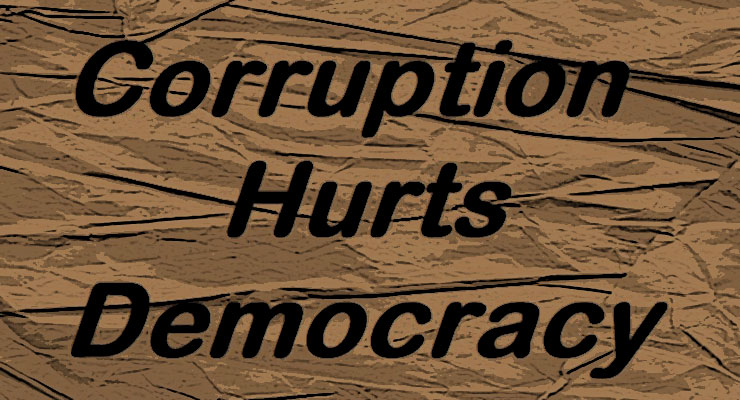
From Voice Of America
For many South African voters, the government’s struggle with corruption — which in the past five years has provoked numerous inquiries, dominated headlines, and even forced out former President Jacob Zuma — isn’t about the staggering scope of the problem, though a minister in the ruling African National Congress has estimated that corruption could be costing the economy nearly $2 billion every year.
For student Mathabo Mokopane, all it took to turn her off the ANC-led government was a tiny road, in her tiny town in rural South Africa.
“There was a contract that came to do the paving,” she told VOA recently, as she stood on the side of a rural highway, waiting for a lift into town.”And then, the [ward] councilor’s friends got the tender. And actually their papers were expired, while they still got the tender, while there were people who were supposed to get the tender.”
Anger over corruption has thoroughly saturated South Africa’s electorate, from the Johannesburg township of Alexandra — where residents protested earlier this month about a lack of basic services in a neighborhood that is walking distance from the richest square mile in Africa — to the open fields of the Northern Cape, where residents say corruption has stymied development, leading to fewer job opportunities and a worse quality of life.
South Africans are universally furious because it has personally affected so many of them, says Ronald Chauke of the Organization Undoing Tax Abuse, a South African watchdog.
“Me, actually, I’m very, very angry and disturbed by this,” he told VOA, in Johannesburg.”Most of our young people who are economically active and who are supposed to be constructively contributing to the community, they are left jobless, they are basically without hope. So this corruption on its own, to be honest with you, it has ruined the lives of many, many people.”
However, says analyst Ivor Sarakinsky, the issue has not put the ANC on the back foot. That’s because, he says, the ruling party still plays better politics than their competitors, even when it comes to such thorny issues.
“It should be a much higher issue in the campaign trail,” he told VOA. “And we’re not seeing any of the parties play this corruption card. It’s something that the ANC’s very vulnerable to. … So when the opposition have been trying to use the corruption issue to campaign, they’ve done it ham-handedly and it’s backfired. The ANC has acknowledged corruption, they’re playing, ‘we were wrong, trust us again, we’ll correct,’ and South Africans are very forgiving and that messaging seems to have gone down and neutralized the ability of the opposition parties to monopolize the debate on exactly that corruption issue.”
Chauke agrees — and notes that the opposition parties, too, have their own skeletons. That leaves voters in a predicament, he says.
“Most of the electorate are asking the question, ‘Who is the suitable and appropriate alternative to the ANC?’ Because the ANC has ruined the country, has taken us far back in terms of economic development and industrialization,” he said. “But it seems we don’t have a proper alternative who can take that baton and take the country forward. So we are basically in the unfortunate situation which we prefer that somehow, some way, maybe President Cyril Ramaphosa, if he’s given a chance, he can try to do a better job. But the situation is bleak. The future doesn’t look good at all.”
It’s a depressing coda to the otherwise uplifting tale of the Rainbow Nation where, 25 years ago, millions of jubilant South Africans lined up to vote for the first time.
This year, Mokopane says she and her friends have come up with a solution. This group of 20-somethings, all members of the so-called Born Free generation, say they’re not going to vote at all.
Leave a Reply